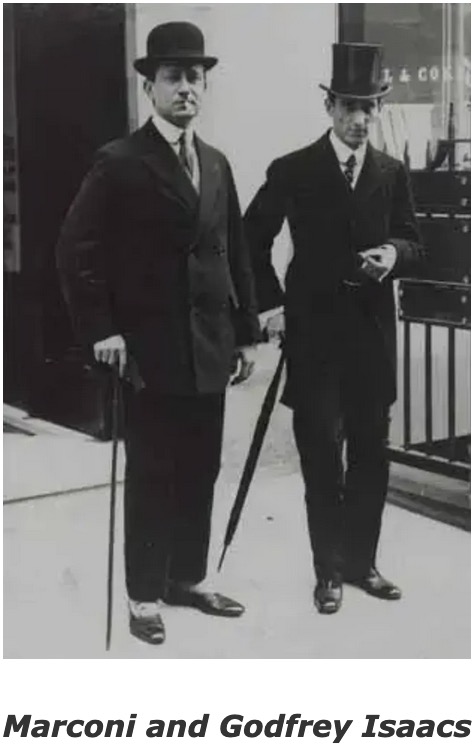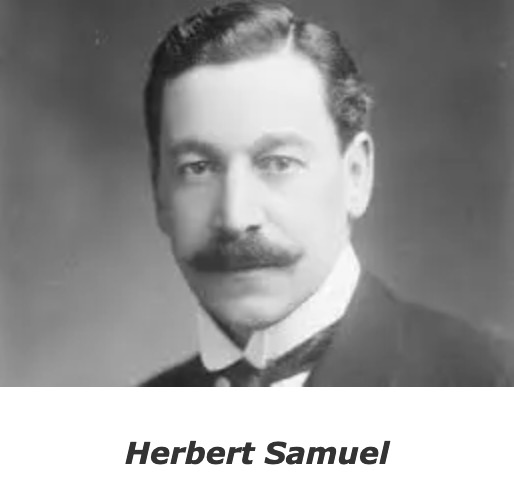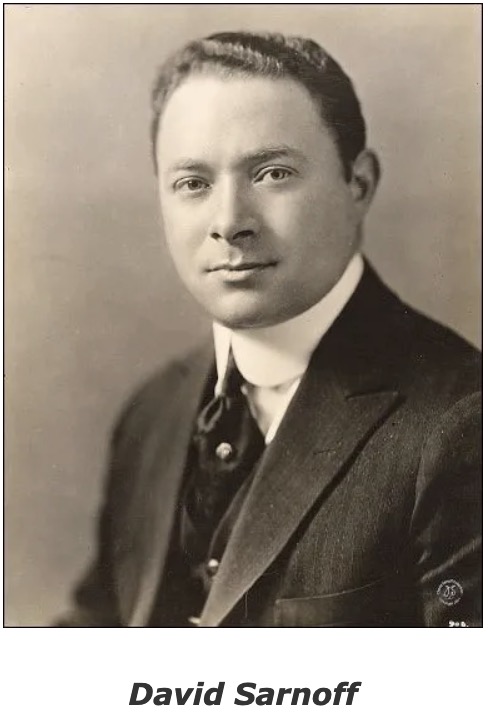This series of posts covering the topic of the unsavoury origins of the BBC is re-posted by kind permission of The Occidental Observer, where the original article can be found in full at this link. This is Part 1 of 4 parts.
Chaos of the Ether, Or “The Second Marconi Scandal”: On the origins of the BBC
In the last article I discussed the role of the press and broadcast media in undermining peace in the years preceding the British declaration of war against Hitler’s Germany. My research led me to examine the origins of the British Broadcasting Corporation, which I found to be closely related to the forming of the Radio Corporation of America (owner of the National Broadcasting Company) and the Columbia Broadcasting System, long-dominant and first two broadcasting corporations in the USA.
The role of the small Jewish minorities in the USA and Britain in the forming of each of these corporations, and in ownership and management of major media organisations ever since, has been of historic importance. By the late 1930s, the BBC, NBC and CBS were all actively assisting the forces aiming at war with Germany. In the cases of both Britain and America, the first two decades of what came to be called public broadcasting set the trend for the relationship between the media, the public, and the state that exists now.
Marconi and Isaacs
The BBC was intentionally founded as a broadcasting monopoly reliant on technology patented by Marconi’s Wireless Telegraph Company. The BBC’s founders followed the example of Guglielmo Marconi himself. According to James Crowther, Marconi “aimed from the first at a monopoly of wireless”, following “his first patent, the first in wireless, with every possible patent of each conceivable improvement”, trying to “establish an impregnable defensive position” around his innovations.1 His family wealth and connections “helped him to secure financial support for founding the first wireless company in 1897”.2 An American subsidiary followed. The Marconi Company produced a series of innovations but was of limited financial success under Marconi’s management.3 Looking to delegate so as to focus on research, in 1909 Marconi was recommended “a very young but fairly experienced businessman”, Godfrey Isaacs, by whom he was impressed, “chiefly because of [Isaacs’] City connections, and his influence with finance houses in London and Europe.” After a trial period, Isaacs became Marconi’s managing director.4 In March the following year, his brother Rufus, Liberal MP for Reading, became Solicitor-General in the government of Herbert Asquith, and in October the same year became Attorney-General and the second professing Jew in a British cabinet.5

Godfrey Isaacs “set out first to consolidate the Company’s hold on the key wireless patents. Then he sought to increase turnover by offering new technical services, by using aggressive salesmanship to capture business from rivals in established markets, and by building up the financial interest of the parent company in associate companies abroad.”6 Guglielmo Marconi had lobbied the British government to adopt his ‘imperial wireless chain’ project, which would create a vast state monopoly with his firm as the sole supplier. Largely due to the persistence of the new managing director and his “vague threats about the possibility of selling the Marconi system to Germany if the British government was not interested”, the government took the proposal with increasing seriousness, eventually contracting Marconi as the construction supplier—less than the full monopoly sought but a lucrative and prestigious contract.7
In March 1912, “having virtually concluded the dealings with the English government”, Isaacs and Marconi travelled to New York, “ostensibly for a legal action against the American Marconi Company’s chief rival, the United Wireless Company of America, over a question of patent infringements.” United Wireless was in a perilous state due to corruption and mismanagement and the Marconi action aimed to “eliminate their rival” before new owners could revive it and “obtain the assets” of the company; in order to benefit by making use of the newly-acquired assets, Marconi needed to increase its working capital by issuing new shares. “The directors of American Marconi insisted that, before they would agree to the increase in capital, the English company should guarantee the ‘whole amount to be subscribed’.”8
The assets were acquired successfully. The parent company’s aggressive attempts to enact the guarantee, and the coincidence of the RMS Titanic disaster in April, which caused a surge of demand for Marconi’s ship-to-shore communication devices, led to the infamous Marconi Scandal of that year; Godfrey and Rufus Isaacs, with their brother Harry, along with the Chancellor of the Exchequer, David Lloyd George, and a senior government whip, Alexander Murray, were accused of insider trading, though were not found by Parliament to have done wrong.9,10 The Postmaster-General, Herbert Samuel (born Eliezer ben Pinchas Shmuel), the first professing Jew in a British cabinet, was accused of favourable treatment of Marconi’s imperial wireless project.11

David Sarnoff and RCA
The career of David Sarnoff, a Jewish immigrant to the US from a village near Minsk, began at the American Marconi Company. Sarnoff appears to have excelled as a wireless operator when wireless technology was primarily used for shipping communication. Guglielmo Marconi had expected his own innovations to result in ‘wireless telephony’ between two individual parties. According to Ronald Coase, in about November 1916 Sarnoff wrote to Isaacs envisaging “the possibility of a broadcasting service”, wherein sound would be transmitted openly to all those with the ability to receive and listen to it. 12
Sarnoff, at the age of 25, had in the US already become a “spokesman for the industry, in his capacity as secretary of the Institute of Radio Engineers”. 13 When the USA declared war on Germany in April 1917, the government “took control of all high-powered radiotelegraphy stations, including those of the Marconi Company”. 14 By the end of 1919, the government, especially the Department of the Navy and the protectionist element in Congress, compelled American Marconi to yield its assets to the new Radio Corporation of America, which, according to Eugene Lyons, was “the old American Marconi Company in a revised corporate form, with major ownership and dominant control vested in General Electric”. RCA’s articles of incorporation obviated foreign control. 15 Owen Young, the first chairman of RCA, was a senior executive at General Electric, which was firmly aligned with the business and political interests centred upon J P Morgan. 16
David Sarnoff began at RCA as the commercial manager, but with great influence over the whole company. As Eugene Lyons describes:
“At the time RCA was born, research engineers … were concentrating on a transmitter for radiotelephony. Point-to-point communication still seemed the essence of the challenge. Almost at once Sarnoff began to press them to switch priorities, to concentrate their energies on apparatus for household reception and transmission geared to the same purpose.” 17
Sarnoff’s intention of bringing about a broadcasting service required the ‘pooling’ of patents held by RCA with those of other, potentially rival, firms. As Lyons says,
“Young’s business acumen solved the problem by drawing Westinghouse into the GE-RCA pool. Through an agreement that became effective in mid-1921, the Westinghouse storehouse of radio patents and licenses became accessible to GE and RCA. In return, Westinghouse won a 40 percent share in all manufacturing for RCA, with GE retaining 60 percent for itself.”
United Fruit also owned some important wireless patents and joined the ‘Radio Group’ patent pool. 18

Sarnoff’s long-term strategy consisted of gathering and leveraging patents and excluding most, or if possible, all rivals from being able to compete; thus, though RCA separated from Marconi, both companies were led by men driving at very similar cartelist or monopolist strategies relying on Marconi’s patent power.19 Historians, especially Lyons, portray Sarnoff as a public-spirited visionary, but even the most laudatory accounts clearly show that he resembled a baron ruling a fief, and was as willing to deprive the public of the benefits of innovation as he was to deliver them. 20
Footnotes:
1 Six Great Inventors (3rd ed.), James Crowther, 1960, p138
2 TheMarconi Scandal and Related Aspects of British Anti-Semitism, 1911-1914, Kenneth Lunn, 1978, p1
3 Lunn, p2
4 Lunn, p3
5 The ability of Jews to sit in Parliament owed to the lobbying of Lionel de Rothschild in the previous century. Lionel’s friend Benjamin Disraeli was of Jewish ancestry but professed Christianity.
6 Marconi, W P Jolly, 1972, p190
7 Lunn, p222
8 Lunn, p4-5
9 David Sarnoff, Eugene Lyons, 1966, p60. Also see Lunn, p4-5. Eugene Lyons, a biographer of Sarnoff, was also a Jewish immigrant from the same village and was Sarnoff’s junior by seven years.
10 “[GK] Chesterton… made much of the fact that Godfrey Isaacs had been at the head of or implicated in no less than twenty bankrupted companies, and someone with a sandwich board with words to this effect had wandered up and down the street outside Godfrey’s office.” https://counter-currents.com/2016/03/the-marconi-scandal/
11 We mention five different Postmaster-Generals in this essay; it was a vital position in relation to telecommunications.
12 Coase adds “doubtless the same idea had occurred to others.” The Origin of the Monopoly of Broadcasting in Great Britain, Ronald Coase, Economica (New Series), Volume 14, Number 55, August 1947, p190.
13 Lyons, p75
14 Lyons, p76
15 Lyons, p80-4
16 J P Morgan, son of the famous financier of the same name, had influenced the US in favour of joining the Great War on Britain’s side and profited enormously from the outcome. Morgan partners, and Morgan senior himself, had since the start of the century been leading advocates of ‘progressivism’, ‘preparedness’ for war and ‘elasticity’ in money.
17 Lyons, p97
18 Lyons, p94-5. “All manufacturing was to be done by GE, all marketing and communications services rested with RCA. By means of a cross-licensing arrangement, each organization had full access to wireless patents held by the other. Not a word was said, forthrightly, about broadcasting; even at the end of 1919 its business potential was underrated or ignored—except by the commercial manager.” Lyons, p84
19 Sarnoff became president of RCA in 1929.
20 To be discussed in a future article (On theoccidentalobserver.net).
For the remaining parts of this study, click here for Part 2, click here for Part 3, and click here for Part 4.
